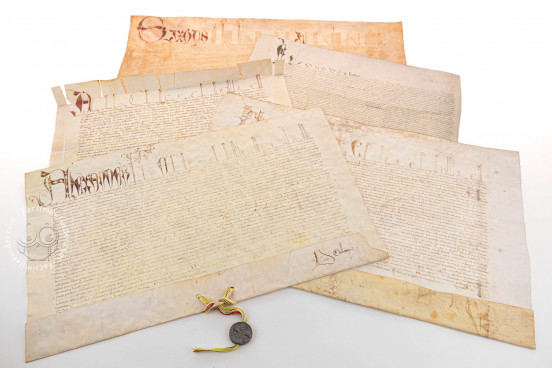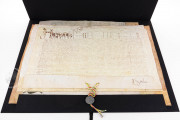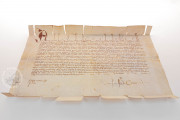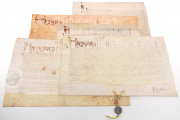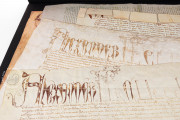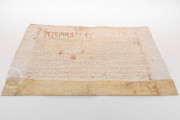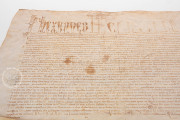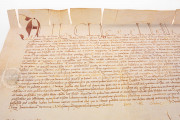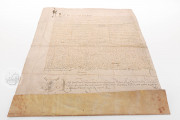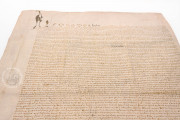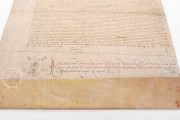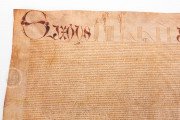This collection of documents comprises four bulls issued in 1481 and 1493 by Popes Sixtus IV and Alexander VI partitioning European conquests in the Atlantic Ocean, Africa, and the Americas between Portugal and the united monarchies of Castile and Aragon. A fifth document is a proclamation, dated 1530, by Alonso Fonseca, Archbishop of Toledo, which includes a complete transcription of one of the bulls. All five are imposing single-sheet documents with the names of the authorities—Sixtus, Alexander, and Alonso—prominently written in large display script.
The documents are a fundamental source for the history of the modern world and the study of international law in the early modern period since they set the stage for the treaty that governed the colonization of the Americas for generations.
The Atlantic Islands and the Coast of Africa
Pope Sixtus IV issued the bull Aeterni regis ("eternal king," after its opening words) on June 21, 1481. It gave the Canary Islands to the "Catholic Monarchs"—Isabella I of Aragon and Ferdinand II of Castile—and stipulated that further territorial acquisitions by Europeans in Africa and the Indies were granted to Portugal.
The Americas
Two bulls issued by Pope Alexander VI on subsequent days—May 3 and 4, 1493—are titled Inter caetera ("among others"). The first was considered insufficiently precise and was first amplified and then superseded by the second. Inter caetera and a supplemental bull, Dudum siquidem ("since formerly")—issued on September 25, 1493—are sometimes termed the "Bulls of Donation."
The bulls of 1493, modeled on Aeterni regis and revising its content, gave to Aragon and Castile a claim to "all islands and mainlands whatsoever, found and to be found, discovered and to be discovered, that are or may be or may seem to be in the route of navigation or travel towards the west or south . . . 100 leagues west of the Azores."
Papal Bulls and Their Promulgation
A papal bull is, by definition, an edict issued by a pope of the Roman Catholic Church bearing a lead seal (bulla) ensuring its authenticity. One of the bulls issued by Alexander in this collection still boasts its seal, with portraits of Saints Peter and Paul on the obverse (front) and Alexander's name on the reverse (back).
A copy of the second Inter caetera incorporated into Alfonso Fonseca's proclamation is one of many distributed in Aragon and Castile to support Spanish claims in the Americas.
Foundation Documents
Although modified by the 1494 Treaty of Tordesillas, the papal bulls of 1493 set the stage for Catholic Europe's understanding of sovereignty over non-Christian lands beyond Europe. The bull Aeterni regis is in the Arquivo Nacional da Torre do Tombo. The original bulls of Alexander VI (Inter caetera, Inter caetera, and Dudum siquidem) are preserved in the Archivo General de Indias. The proclamation of the archbishop of Toledo is in the Archivo General de Simancas.
We have 1 facsimile edition of the manuscript "Documents concerning the Non-Catholic World (Collection)": Bulas de Alejandro VI facsimile edition, published by Testimonio Compañía Editorial, 1995
Request Info / Price
